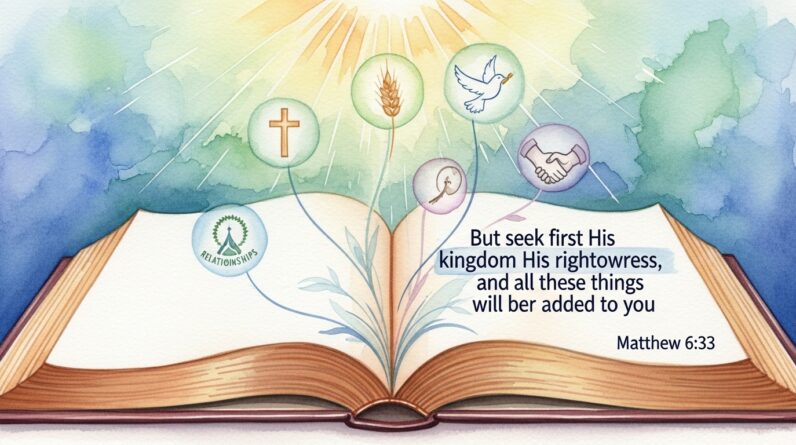The Power Of Covenant Love In A Christian Marriage
You probably already know that marriage is important, but have you thought much about what makes a Christian marriage different from a purely legal arrangement? When you adopt the biblical concept of covenant marriage, you’re embracing more than a contract signed and sealed — you’re entering a relationship framed as a sacred, lifelong commitment before God. This article walks you through what covenant marriage means biblically, why it matters, and how covenant love practically transforms your day-to-day relationship.
Covenant language runs deep through Scripture. When God brought Adam and Eve together, he intended something enduring, intimate, and holy — a union designed to reflect God’s own covenant faithfulness. You’ll see the Bible’s teaching on marriage again and again as a call to mutual commitment, sacrificial love, and ongoing reconciliation. This article uses those biblical insights, with links to the verses on Bible Gateway so you can read them in context, and then shows practical steps you can take to live out a covenantal approach to marriage.
What does “covenant marriage” mean?
Covenant marriage is not just a modern legal term; it’s a theological concept rooted in Scripture. A covenant differs from a contract in that it is founded on a relationship and sworn promises upheld by sacred obligation rather than merely negotiated terms. In the Bible, marriage is described as a union that joins two people into one flesh — a bond meant to be permanent and reflective of God’s faithful relationship with His people. See how Genesis describes the union: Genesis 2:24.
When you view your marriage as a covenant, you orient your choices around permanence, sacrificial love, and the presence of God in your relationship. That shift in understanding changes how you handle conflict, sexuality, finances, parenting, and even daily habits. A contract can be broken when it’s no longer convenient; a covenant is meant to be lived out even when it’s costly.
Covenant marriage in Scripture: the foundation
Scripture repeatedly points to marriage as a covenantal reality. Jesus affirmed the permanence of the marital bond when He pointed back to God’s design in Genesis: “So they are no longer two, but one flesh. Therefore, what God has joined together, let no one separate.” See the passage in Matthew: Matthew 19:4-6.
Paul frames marriage as a picture of Christ and the church, calling husbands to love sacrificially and wives to respect, within a context of mutual submission: Ephesians 5:21-33. Malachi’s sharp warning about the seriousness of breaking faith in marriage underscores how covenantal this bond is intended to be: Malachi 2:14-16. When you read these passages, you see that marriage is meant to point beyond itself to God’s unbreakable faithfulness.
Covenant versus contract: why the distinction matters
When you treat marriage as a contract, you reduce it to terms, conditions, and exit clauses. Contracts are transactional and contingent. Covenants are relational and binding. The Bible’s covenant language emphasizes responsibility, faithfulness, and mutual care even when emotion fades or circumstances change.
Think about the implications: in a covenantal view, you don’t only stay married because feelings persist — you stay because vows were made before God and your spouse. Covenant love asks you to prioritize the long-term vitality of the relationship and the holiness of your commitments. That changes how you approach forgiveness, finances, parenting, and sexuality. It also reshapes how the church accompanies couples: not as a legal overseer, but as a spiritual family that helps you remain faithful.

Covenant love mirrors God’s faithfulness
At the heart of a covenant marriage is covenant love — a love that reflects God’s steadfast love for you. God initiated covenants throughout redemptive history: with Noah, Abraham, Israel, and ultimately fulfilled in Christ. Those covenants reveal a God who pursues, promises, and keeps faith with His people. When your marriage is covenantal, it becomes a living picture of that divine commitment.
Paul uses the marriage relationship to illustrate Christ’s love for the church: husbands are to love sacrificially and wives to respond devotedly, reflecting mutual respect and the image of Christ’s redeeming work. Read the imagery in Ephesians: Ephesians 5:25-27. When you love covenantally, you practice a love that prioritizes the flourishing of your spouse over personal comfort and mirrors the steady love God shows you.
How covenant love transforms your daily life
If you adopt a covenant mindset, you’ll notice practical changes. Small decisions — how you speak to your spouse, whether you keep promises, how you steward time and money — begin to bear witness to the seriousness of your vows. Covenant love makes your marriage resilient because it’s rooted in commitment rather than emotion alone.
You’ll respond differently in conflict, too. Instead of seeing disagreements as reasons to withdraw or look for an exit, you’ll engage in restoration and reconciliation. Scripture calls you to be quick to listen and slow to anger, to forgive as you have been forgiven, and to pursue peace actively. See Colossians and Ephesians on these attitudes: Colossians 3:12-14 and Ephesians 4:26-32. These instructions are not just moral lessons; they’re practical tools to sustain covenant marriage.
Mutual submission, equality, and distinct roles
Covenant marriage does not mean one spouse dominates the other. Instead, Scripture calls for mutual submission rooted in love. Paul begins his teaching on marital roles by urging believers to submit to one another out of reverence for Christ: Ephesians 5:21. Husbands and wives bring complementary gifts to the marriage, and covenant love invites you to use those gifts for the good of the relationship.
Ephesians 5:22-33 has sometimes been misused, but read within the context of mutual submission and imitation of Christ’s sacrificial leadership, it points to a marriage where both spouses honor and serve each other. Husbands are called to love selflessly; wives are called to respond with respect and partnership. It’s a picture of interdependence, not hierarchy.
Trust, forgiveness, and reconciliation as covenant practices
You can’t build a covenant marriage without trust, forgiveness, and the willingness to be reconciled. These are not optional extras — they are central to covenant life. The Bible repeatedly calls you to forgive one another as the Lord forgave you: Colossians 3:13. Forgiveness doesn’t always mean ignoring wrongdoing, but it does mean choosing to release the debt and pursue restoration.
Jesus gives practical steps for reconciliation in Matthew: go privately to the person, seek restoration, and involve the community if needed. See Matthew 18:15-17. In a covenant marriage, reconciliation is not just about fixing an argument; it’s about protecting the sacred bond and reflecting God’s reconciling work through Christ.

Intimacy as covenant expression
Physical and emotional intimacy are vital ways you live out covenant love. Scripture celebrates marital intimacy as good and precious: “Drink water from your own cistern, running water from your own well,” says Proverbs, urging faithful enjoyment within the marriage Proverbs 5:15-19. Hebrews also honors marriage and sexual faithfulness: Hebrews 13:4.
When you treat sex and affection as expressions of covenant love, you protect them from cheapening or casual misuse. Intimacy becomes a safe space where you both find belonging, affirmation, and joy. You’ll approach vulnerability differently when you see your body and your spouse as entrusted to you by God and designed for mutual delight.
Communication and conflict: covenantal habits
You can’t overstate how important communication is in a covenant marriage. Communication disciplines are not only about clarity but about cultivating trust and safety. Covenant love encourages you to be honest without being hurtful, to listen with a posture of humility, and to repair quickly when words wound.
The Bible gives wisdom for handling conflict: don’t let the sun go down on your anger, act with kindness, and be ready to seek help when you’re stuck. See Ephesians 4:26-27, 31-32. These aren’t just do’s and don’ts; they’re character-forming practices that foster covenant trust.
Finances, stewardship, and covenant responsibility
Finances are a frequent battlefield in marriages, but they’re also an opportunity to practice covenant faithfulness. When you manage money as a shared stewardship given by God, you align your financial decisions with the priorities of care, generosity, and mutual support. Scripture urges you to honor the Lord with your wealth and to be generous: Proverbs 3:9-10.
Covenant marriage calls you to transparent, wise financial practices: budgeting together, planning for the future, and tending to needs with sacrificial care. When money decisions are made as part of the covenant commitment, you protect your marriage from secrecy, fear, and selfishness.
Raising children within a covenant framework
If you have children or plan to, covenant marriage shapes how you parent. Scripture frames parenting within covenant responsibility — training, instructing, and modeling faithfulness. Ephesians calls parents to bring up children “in the discipline and instruction of the Lord”: Ephesians 6:4. Proverbs says to train a child in the way they should go: Proverbs 22:6.
Raising children in a covenant atmosphere means your home is a place where faithfulness, forgiveness, and sacrificial love are modeled daily. Your marriage is the primary teaching tool; your children learn faithfulness from seeing you keep vows, admit faults, and pursue reconciliation.
When marriage breaks: addressing separation, divorce, and restoration
Sometimes marriages suffer deep wounds. The Bible addresses situations of marital failure and brokenness with both seriousness and compassion. Jesus acknowledged that Moses permitted divorce because of the hardness of heart, but His ideal was enduring commitment: Matthew 19:8-9. Paul offers pastoral guidance in cases of abandonment: 1 Corinthians 7:15.
If you find your marriage in crisis, covenant theology doesn’t mean silence or unhealthy staying. Rather, it calls for wise, gospel-centered responses: seek biblical counsel, involve the community of faith, pursue reconciliation when possible, and protect vulnerable parties. Restoration is possible, and the church should be a place of mercy that seeks to heal and restore where it can.
Covenant renewal: rituals, vows, and daily choices
Renewing your covenant can be a powerful practice. Some couples formalize it with vow renewals; others make daily, small vows of kindness and presence. What matters is that you intentionally remind yourselves of the seriousness of your commitment and the grace that sustains it.
Jesus calls his followers to remain steadfast and faithful. The apostle Paul urges believers to encourage one another and to stir one another to love and good deeds: Hebrews 10:24-25. Rituals — public vows, prayer services, or private liturgies — can help you re-center your marriage on God’s presence and your shared calling to faithfulness.
The church’s role in supporting covenant marriages
Your marriage doesn’t exist in isolation. The church is meant to be a family that supports, disciplines, and celebrates covenant marriages. The community can provide counseling, accountability, practical help, and prayer. Scripture calls believers to confess sins to one another and pray for healing: James 5:16. It also instructs the church to bear one another’s burdens and encourage steadfastness.
When you allow yourself to be supported, your marriage benefits from the wisdom and love of others. The church can help you weather storms, celebrate joys, and cultivate the habits that sustain covenant love.

Practical disciplines for cultivating covenant love
Covenant love is formed by habits more than feelings. You can cultivate it through daily disciplines that orient you to one another and to God:
- Pray together and for one another.
- Read Scripture as a couple and apply it to your relationship.
- Serve together in church or community.
- Keep regular times of conversation, confession, and celebration.
- Practice financial transparency and mutual decision-making.
These disciplines are spiritual practices as much as relational ones. Paul’s instruction to clothe yourselves in compassion, kindness, humility, gentleness, and patience is a practical checklist for everyday marriage life: Colossians 3:12-14. When you intentionally embody these virtues, you build covenant trust.
Stories and models: what covenant marriage looks like
You’ll find examples across Scripture and church history of marriages that illustrate covenant love. From the steadfastness God commends in the prophets to the sacrificial picture of Christ and the church in Paul’s letters, the Bible offers narratives and teachings that show covenant lived out in real circumstances.
In your own context, covenant marriage may look like ordinary acts of faithfulness: staying when it’s hard, seeking forgiveness, making sacrificial choices for the good of the other, and keeping God at the center. These aren’t dramatic, headline-grabbing acts; they’re daily decisions that, over time, shape a marriage into a testimony of God’s faithfulness.
Common challenges and gospel-centered responses
Every marriage faces trials: unmet expectations, differing personalities, betrayal, financial strain, illness, or loss. Covenant marriage doesn’t erase these challenges — it provides a framework for facing them together. The gospel gives you resources: justification when you fail, sanctification over time, and hope for restoration.
When you’re tempted to treat marriage transactionally, return to the gospel. Jesus’ love for you is not based on your performance, and that frees you to love sacrificially even when your spouse falls short. The apostle Paul’s words about love in 1 Corinthians remain a corrective and a guide: 1 Corinthians 13:4-7. Apply those traits to your marriage and you’ll see covenant love reshape how you relate.
Practical steps for today: moving toward covenant marriage
If you want to strengthen the covenantal character of your marriage, begin with small, steady steps:
- Revisit your vows and talk honestly about what they mean to you now.
- Commit to weekly times of prayer and Scripture together.
- Establish financial transparency and a shared budget.
- Seek pastoral or professional counseling if patterns of harm persist.
- Build a community of support — friends, mentors, and church family who will encourage you.
These steps are not quick fixes but steady, faith-filled practices. Covenant marriage grows in time as you and your spouse keep choosing each other and choosing God.
The long view: covenant marriage as a witness
Covenant marriages are more than private agreements; they’re public testimonies. When you remain faithful, forgiving, and sacrificial, your marriage becomes a witness to God’s steadfast love. The world watches marriages for what they reveal about commitment, hope, and the possibility of lasting love.
Jesus said that your love for one another would be a witness to the world that you are his disciples. Covenant love in your marriage is one tangible way to show that witness to your family, community, and church. Live it well, and your marriage will point others to the faithful God who holds all covenants.
A final pastoral encouragement
Covenant marriage is demanding because it calls you to reflect a God who is entirely faithful. But you don’t pursue this alone. God’s grace is available to you through prayer, Scripture, the sacraments, and the community of faith. Trust in that grace as you practice the habits that form covenant love — kindness, patience, humility, forgiveness, and sacrificial service.
If your marriage feels fragile, take heart: God specializes in restoration. Seek help, engage your church, and keep your eyes on Christ. The power of covenant love is not simply in human resolve, but in the transforming presence of God working through your commitment and actions.
Explore More
For further reading and encouragement, check out these posts:
👉 7 Bible Verses About Faith in Hard Times
👉 Job’s Faith: What We Can Learn From His Trials
👉 How To Trust God When Everything Falls Apart
👉 Why God Allows Suffering – A Biblical Perspective
👉 Faith Over Fear: How To Stand Strong In Uncertain Seasons
👉 How To Encourage Someone Struggling With Their Faith
👉 5 Prayers for Strength When You’re Feeling Weak

📘 Jesus and the Woman Caught in Adultery – Grace and Mercy Over Judgement
A powerful retelling of John 8:1-11. This book brings to life the depth of forgiveness, mercy, and God’s unwavering love.
👉 Check it now on Amazon 🛒💥
🔥 “Every great message deserves a home online.” 🌍💬🏡
Don’t let your calling stay hidden. Start a Christian blog or website using Hostinger — with 99.9% uptime, a free domain, and SSL, your voice can shine for God’s glory anytime, anywhere.
💥 Begin today. 🛒 Try it RISK-FREE! ✅
✝️ “Your body is God’s temple — care for it with purpose.” 💪💖🏛️
Renew your energy and restore balance naturally. Mitolyn helps support a healthy metabolism, giving you the vitality to live out God’s calling with strength and confidence.
🔥 Unlock Your Metabolic Power! ⚡Burn More Calories & Feel Great With Mitolyn. 💪
👉 Start Today. 🚀 Check Price Now. 🛒💰
💰 As a ClickBank & Amazon Affiliate, I earn from qualifying purchases.
📖 Acknowledgment: All Bible verses referenced in this article were accessed via Bible Gateway (or Bible Hub).
🚀 Want to explore more? 👉 Dive into our new post on Why Jesus? and experience the 🔥 life-changing truth of the Gospel!





